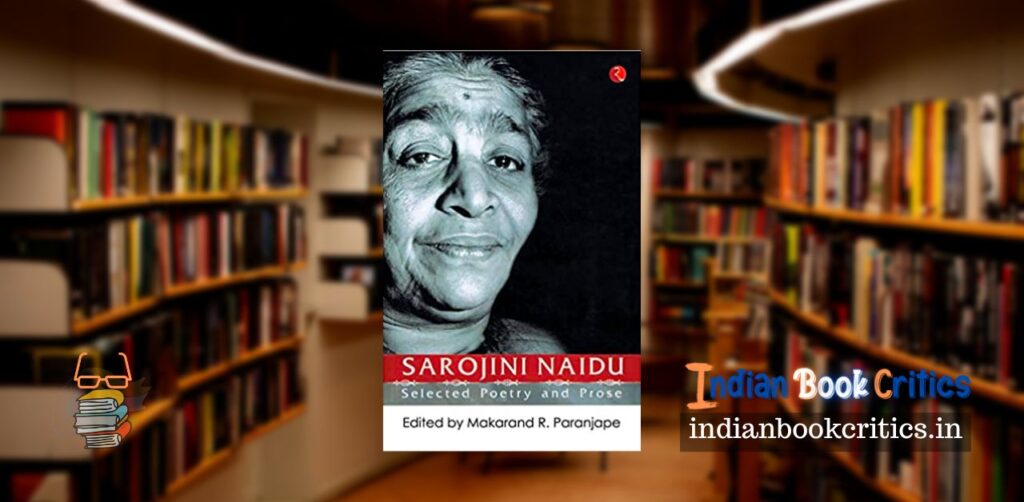One of the finest English poets India produced, Sarojini Naidu, wrote many poems before independence and continued her literary ventures after India became free from the unholy clutches of the British. Naidu’s poetic output juxtaposed with her eloquent speeches and essays, prose pieces and powerful spiritual explorations with words does not emit the same radiance. However, it is not wise to presume that her poetry wasn’t up to the mark – in the first recognised generation of Indin English poets, Sarojini Naidu is certainly there after Sri Aurobindo and Tagore. In today’s article, I will review a remarkable edition of the selected prose and poetry by Sarojini Naidu, edited by well-known literary scholar Makarand Paranjape.
First of all, let me begin by telling you that the introduction to this book is amazing! It is certainly one of the best commentaries on the literary output of Sarojini Naidu that any research scholar may get. The way Makarand begins the writing by establishing a very sweet connection with Naidu through a room, which tells a lot about his humour as well as his sentimental connection to the works of Naidu. Well, that aside, the introductory address has been flawless, a very balanced evaluation of the literary career of Sarojini Naidu, the nightingale of India (why?).
About the poetry of Naidu, there is very much to discuss. From the way she arranges her thoughts in a perfect sequence to the way she finds perfect images to exhibit her emotional and intellectual depth, everything about her verse is unique (and that only gives her a dignified place among literary luminaries of India). Once you carefully go through the poems that Paranjape has selected to be included in this valuable edition, you will notice many features in the poetry of Naidu. Some of them may be listed for a better understanding of readers.
- Use of imagery: It is not something that many people need to be told. Sarojini Naidu’s poetry is enriched with vivid and descriptive imagery, which helps to bring her themes and ideas to life for the reader. From the bazaars of Hyderabad to the epics from the ancient Hindu vaults of wisdom, she always finds something to relate to and also includes her readers in the rich discussions.
- Themes of love and nature: Further studying the imagery that Naidu employs in her poems, one can notice that many of Naidu’s poems explore themes of love and the natural world. And to make it effective, the poet often uses images of flowers, animals, and the seasons to convey these themes. It not only enhances the poetic beauty but also enriches the experience of the readers of Naidu’s poetry.
- Patriotism and social justice: Since Naidu may be better known as a political activist and freedom fighter, her poems do include themes that reflect her struggle, activism and involvement. Naidu’s poems often deal with patriotic themes that may have inspired her readers to raise their voices against the oppressors during the British captivity of India. Her poetry also concerns social and political issues, and she was deeply committed to the cause of India’s independence. As such, themes of patriotism and social justice are common in her work.
- Use of traditional poetic forms: She often accepted that her inspiration for poetry came from the ancient Hindu epics and Persian literature she read. She also read English literature widely. Therefore, one may not help oneself but notice Naidu’s poetry often employs traditional poetic forms such as sonnets and ballads, and her work is characterized by a strong sense of rhyme and meter. It does
And beyond these features, there are many other things that may be discussed. However, in whatever way you discuss the works of Naidu, these prominent themes will always feature. Prose works, unlike poetry, often discuss prominent figures in the Indian freedom struggle – Gandhi, Nehru, Gokhale and others. Well, it may be ironic in retrospect that Naidu did not correct her flowery opinions about Muhammad Jinnah, the responsible person who played a very important role, alongside Nehru and Gandhi and others, in cutting India into two pieces on the basis of religion and yet not fulfilling the terms – India and Pakistan. Naidu called Jinnah the son of Mother India and who did not think twice before extracting his pound of flesh! Her prose writing is marked by mastery of the English language and eloquence.
You can get this special edition of Sarojini Naidu’s work from Amazon India and enjoy reading her writings in prose and poetry. Click the link below:
Ashish for Indian Book Critics
